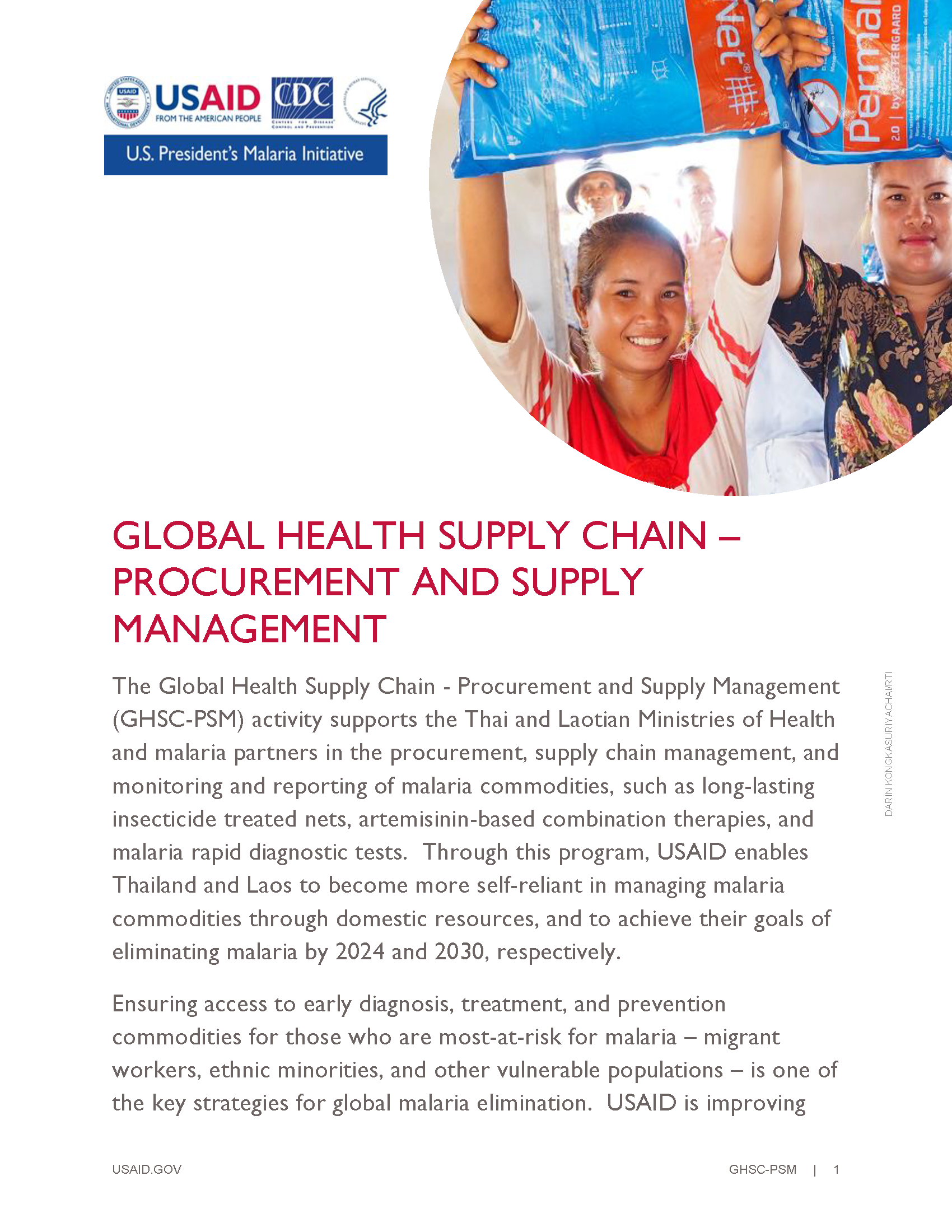Speeches Shim
The Global Health Supply Chain - Procurement and Supply Management (GHSC-PSM) activity supports the Thai and Laotian Ministries of Health and malaria partners in the procurement, supply chain management, and monitoring and reporting of malaria commodities, such as long-lasting insecticide treated nets, artemisinin-based combination therapies, and malaria rapid diagnostic tests. Through this program, USAID enables Thailand and Laos to become more self-reliant in managing malaria commodities through domestic resources, and to achieve their goals of eliminating malaria by 2024 and 2030, respectively.
Ensuring access to early diagnosis, treatment, and prevention commodities for those who are most-at-risk for malaria – migrant workers, ethnic minorities, and other vulnerable populations – is one of the key strategies for global malaria elimination. USAID is improving the long-term availability of malaria commodities in Thailand and Laos to achieve this goal.
FORECASTING NEEDS FOR MALARIA COMMODITIES
GHSC-PSM assists the Thai and Laotian governments with forecasting needs for commodities and analyzing gaps in supply. The program meets with government counterparts and donors to jointly conduct annual forecasts using the countries’ malaria databases and identify areas for USAID support.
ASSISTANCE WITH LOGISTICS AND TRACKING
GHSC-PSM supports Thailand and Laos with managing their orders of USAID-donated rapid diagnostic tests and long-lasting insecticide treated nets, from point of manufacture to in-country delivery.
IMPROVED DATA COLLECTION AND MONITORING
GHSC-PSM assists with improving data collection and monitoring to enable effective planning and supply chain decision-making. The program focuses on ensuring essential procurement and logistics data availability within the national malaria information system. This generates real time reporting and monitoring of procurement and supply management data, enabling rapid response to outbreaks. By doing so, partner countries can prevent the reintroduction of malaria transmission and ensure quality control of commodities, especially malaria drugs, as compromised medication can fuel anti-malarial drug resistance.
IMPACTS AND RESULTS
- Since 2017, GHSC-PSM has distributed 537,088 long-lasting insecticide treated nets and 100,000 rapid diagnostic tests to fill gaps in the countries’ commodity coverage. This support is critical in providing ongoing protection to the most vulnerable populations, such as migrant workers, while both countries work towards independently managing their malaria commodity supplies.
- A rapid assessment and consultation workshop identified requirements to improve national supply chain management for malaria commodities in Thailand and Laos. USAID, through the President’s Malaria Initiative, developed action plans to cover national malaria commodity gaps in close collaboration with the Global Fund to Fight AIDS, Tuberculosis, and Malaria (the Global Fund) and targeted supply chain management technical assistance identified for 2018-2021.
- GHSC-PSM supported the distribution of more than 100,000 long-lasting insecticide treated nets and long-lasting insecticide treated hammock nets, procured through the Global Fund, to villages in 26 provinces of Thailand. This provided coverage during a transition in donor funding and ensured at-risk population access to nets and hammock nets for the upcoming malaria transmission season.


Comment
Make a general inquiry or suggest an improvement.